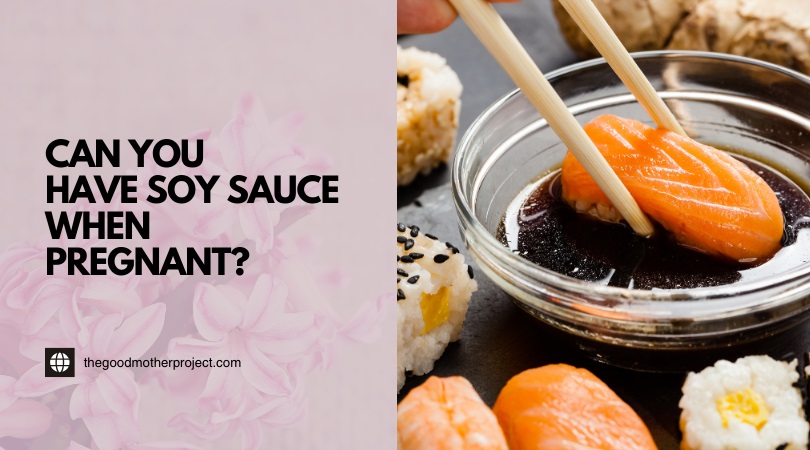Last Updated on January 6, 2025
Yes, you can have soy sauce during pregnancy. It is generally safe in moderation, but watch your sodium intake.
Pregnancy brings many dietary considerations. Expecting mothers often worry about what foods and condiments are safe to consume. Soy sauce, a staple in many cuisines, can be a flavorful addition to meals. It contains fermented soybeans, which provide some health benefits.
However, soy sauce is also high in sodium, which can lead to issues like high blood pressure. Pregnant women should be mindful of their overall salt intake. Understanding the nutritional content and potential risks associated with soy sauce can help you make informed choices. This article will explore the safety of soy sauce during pregnancy and provide tips for enjoying it responsibly.
Soy Sauce And Pregnancy: Safe Or Not?
Pregnancy brings many dietary questions. One common query is about soy sauce. Many wonder if it’s safe to consume during this special time. Let’s explore the facts about soy sauce and its effects on pregnancy.
Nutritional Breakdown Of Soy Sauce
Soy sauce is a fermented product made from soybeans. It adds flavor to dishes but contains some important nutrients. Here’s a quick nutritional breakdown:
| Nutrient | Amount per 1 tablespoon |
|---|---|
| Calories | 11 |
| Sodium | 1,000 mg |
| Protein | 1 g |
| Carbohydrates | 1 g |
| Fat | 0 g |
While soy sauce is low in calories, it is high in sodium. Pregnant women need to monitor sodium intake. Too much sodium can lead to high blood pressure.
Medical Views On Soy Consumption During Pregnancy
Medical experts have mixed views on soy consumption during pregnancy. Some studies suggest moderate consumption is safe. Others raise concerns about phytoestrogens in soy. Here are key points to consider:
- Moderation is Key: Enjoy soy sauce in small amounts.
- Choose Low-Sodium Options: Helps manage salt intake.
- Consult Your Doctor: Always discuss dietary changes with your healthcare provider.
Research shows that soy may offer health benefits. It contains antioxidants and can support heart health. Yet, individual tolerance varies. Each pregnancy is unique.
Potential Health Concerns With Soy Sauce
Pregnancy brings special dietary considerations. Soy sauce is a common condiment. Yet, it may pose health concerns. Understanding these risks helps ensure a healthy pregnancy.
High Sodium Content
Soy sauce contains a significant amount of sodium. High sodium intake can lead to health issues.
- Increased blood pressure
- Fluid retention
- Risk of preeclampsia
Pregnant women should monitor sodium intake. The recommended daily limit is 2,300 mg. Excess sodium can affect overall health.
| Type of Soy Sauce | Sodium Content (per tablespoon) |
|---|---|
| Regular Soy Sauce | 1,000 mg |
| Low-Sodium Soy Sauce | 575 mg |
Presence Of Msg And Its Effects
Some soy sauces contain monosodium glutamate (MSG). MSG enhances flavor but may cause reactions.
- Headaches
- Nausea
- Allergic reactions
Pregnant women may be more sensitive to MSG. It’s wise to check labels. Opt for brands without MSG when possible.
Navigating Soy Sauce Consumption
Pregnancy brings many dietary questions. One common concern is soy sauce. Is it safe to consume? Understanding soy sauce can help you make informed choices.
Choosing Healthier Alternatives
When seeking alternatives to soy sauce, consider these options:
- Coconut Aminos: A soy-free sauce with a sweet flavor.
- Bragg Liquid Aminos: A non-GMO soy sauce alternative.
- Homemade Soy Sauce: Control ingredients for a healthier option.
These substitutes can enhance your meals without the risks. Always check labels for sodium content.
Incorporating Soy Sauce Moderately
Moderation is key when consuming soy sauce. Here are some tips:
- Use small amounts for flavor.
- Pair it with fresh vegetables.
- Opt for low-sodium varieties.
Limit intake to avoid excess sodium. High sodium can lead to swelling and other issues.
Enjoy soy sauce in moderation. Focus on balance and variety in your diet.
Frequently Asked Questions
Can Pregnant Women Eat Soy Sauce?
Yes, pregnant women can consume soy sauce in moderation. It’s generally safe but check for sodium levels.
Is Soy Sauce Safe During Pregnancy?
Soy sauce is safe if consumed in moderation. Excessive sodium can lead to health issues.
Does Soy Sauce Contain Alcohol?
Most soy sauces do not contain alcohol. Some fermented varieties may have trace amounts, but they are minimal.
Can Soy Sauce Affect Baby Development?
Soy sauce in moderation should not affect baby development. Always prioritize a balanced diet during pregnancy.
What Are The Risks Of Soy Sauce?
High sodium content can lead to hypertension. Choose low-sodium versions to minimize risks.
Should I Avoid Soy Sauce Completely?
Avoiding soy sauce is unnecessary unless you have a soy allergy. Moderation is key for a healthy pregnancy.
Conclusion
Pregnancy comes with many dietary considerations. Enjoying soy sauce in moderation is generally safe. Opt for low-sodium varieties to minimize salt intake. Always consult your healthcare provider for personalized advice. Staying informed helps ensure a healthy pregnancy while satisfying your taste buds.








